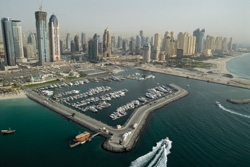GCC financial centres recover

All of the financial centres in the GCC have enjoyed a sharp cyclical recovery in recent years, which is all the more impressive given the global macroeconomic and regional geopolitical challenges.
The Global Financial Centres Index, published by the Z/Yen Group, now ranks Dubai just one place behind Frankfurt at 17, up from 29 in 2013, Abu Dhabi one spot above Shanghai at 19, up from 32, Riyadh at 21, up from 31, and Qatar at 22, up from 26.
“Four of the GCC financial centres are already in the top 25 worldwide. That is fantastic news,” says Oliver Schutzmann, vice-chairman of the Middle East Investor Relations Society.
“The structural strength of these centres remains their geographic location, stability and the combination of financial resources and populations.
“Many federal and economic ties were tested successfully during this time – and they appear to be stronger as a result. The economic recovery, the return of international capital and upgrades to emerging market status are testament to the resilience and attractiveness of the regional financial centres.”
Schutzmann notes, however, that in recent contact with US investors he found there were still concerns regarding regional uncertainty and geopolitical challenges.
Demographics
Ali Khalil, chief operating officer of the Kuwait Financial Centre (Markaz), says: “We are in the middle of changes and these changes will be ongoing for at least 10 years. Risk will be there for a while.
“But this has not impacted a lot of businesses – at the end of the day it is about consumption and this is driven by demographics, which are favourable. Governments have money and they are spending it on infrastructure, so their economies are moving on. Local investment companies have adapted to the uncertainty and are faring well.”
The GCC has indeed remained stable and prosperous throughout the recent period of instability in nearby countries, from Egypt to Russia.
“Regional instability
has impacted positively countries such as UAE, which is considered to be a safe
haven,” says Mazen Boustany, partner at Baker & McKenzie Habib Al Mulla.
“There has been investment from countries such as Iraq, Syria and other ones
that have been negatively affected in the region such as Egypt. A lot of
companies have relocated here
Such money has brought with it concerns around how it was acquired, especially with an international focus on anti-money laundering (AML), and this has increased the workload of regulators across the region.
Daniel van Dongen, senior manager, markets, at the Dubai Financial Services Authority (DFSA), sayds: “The Dubai International Financial Centre has a robust regime of looking into AML issues and that applies to each and every firm that applies for a licence – and they will continue to be monitored.
“While there are certainly concerns that this region is different to the US or Europe, all in all we see a very compliant population of companies. It certainly has our close and continuing attention.”
The internationalisation of Saudi Arabia certainly brings opportunities for other GCC financial centres. But as it has already moved 10 places up the international index and dominates market capitalisation in the region – and with memory of the declines of Bahrain and Beirut – it also brings challenges.
“More funds will go into Saudi Arabia, undoubtedly, but will not dilute the UAE,” says Khalil. “It takes more than just an active market to become a financial centre. It is very difficult to displace an ecosystem that has already been built – from the talent pool to the supporting businesses.
“There has to be a decision to be open. In Saudi Arabia – and for us in Kuwait – there has been a decision not to become totally open. It is not as easy for foreign companies to set up there as in Dubai. The movement of labour is not as easy as in Dubai. I do not think Dubai is going anywhere.”
There has been plenty of regulation produced in Dubai, most of which has gone down very well with market participants, but in many cases the enforcement of that regulation has not yet been properly tested.
Van Dongen says: “We at the DFSA enforce our regulations – there is no doubt about that. But I would say that the initiatives taken are always aimed at avoiding an undue regulatory burden in addition to providing the investor community with internationally recognised standards of disclosure, licensing, ongoing reporting and even for market abuse and insider information disclosures. Everything we do is as much as possible aligned with European Union regulation and directives.”
Indeed, the DFSA is making a concerted effort to attract more funds. For example, it has just launched an initiative to introduce qualified investor funds which “has a very light-touch licensing regime – in a matter of a week you will have your fund up and running,” says van Dongen.
Found this useful?
Take a complimentary trial of the FOW Marketing Intelligence Platform – the comprehensive source of news and analysis across the buy- and sell- side.
Gain access to:
- A single source of in-depth news, insight and analysis across Asset Management, Securities Finance, Custody, Fund Services and Derivatives
- Our interactive database, optimized to enable you to summarise data and build graphs outlining market activity
- Exclusive whitepapers, supplements and industry analysis curated and published by Futures & Options World
- Breaking news, daily and weekly alerts on the markets most relevant to you


